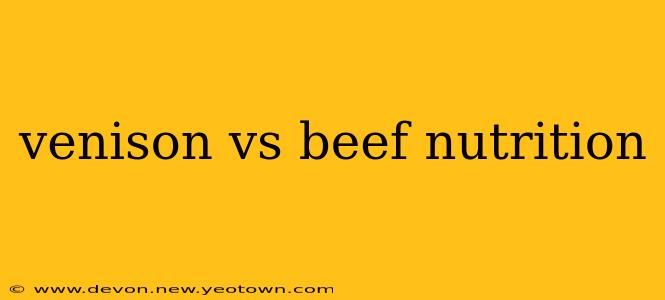The aroma of a perfectly seared steak, whether it's venison or beef, is enough to make anyone's mouth water. But beyond the delicious taste, lies a crucial difference: their nutritional profiles. For health-conscious individuals and discerning cooks, understanding the distinctions between venison and beef nutrition is key to making informed dietary choices. This isn't just about calories; it's about the specific nutrients that fuel our bodies and impact our well-being. Let's delve into this fascinating comparison, exploring the nutritional battleground between these two popular protein sources.
Venison: The Leaner, Wilder Choice
Imagine a crisp autumn day, the scent of pine needles hanging heavy in the air. That's the setting for many venison hunts, painting a picture of a lean, wild animal that embodies the essence of natural nutrition. Venison boasts a significantly lower fat content compared to beef, making it a favored choice for those watching their weight or seeking a healthier protein source. This leanness translates to fewer calories overall, a key factor in weight management strategies. But it's not just about less fat; venison also packs a punch when it comes to certain essential nutrients.
Is Venison Healthier Than Beef?
This is a frequently asked question, and the answer isn't a simple yes or no. While venison is generally lower in fat and calories than beef, the specifics depend heavily on the cut and the animal's diet. However, generally speaking, venison tends to win this nutritional contest, particularly for those focusing on lean protein intake.
Beef: The Classic, Versatile Protein
Beef, a culinary staple across the globe, offers its own nutritional strengths. From succulent ribeyes to lean ground beef, it's a versatile ingredient in countless dishes. While higher in fat than venison, beef remains a significant source of protein and essential minerals like iron and zinc. Different cuts of beef have vastly different fat and calorie content, emphasizing the importance of making mindful choices. Lean cuts, such as sirloin or tenderloin, offer a more balanced nutritional profile compared to richer cuts like prime rib.
What are the Differences in Fat Content Between Venison and Beef?
This is where the nutritional divergence becomes most apparent. Venison consistently shows significantly lower levels of total fat, saturated fat, and cholesterol compared to most cuts of beef. This leaner profile contributes to its reputation as a healthier alternative for those aiming to reduce their intake of unhealthy fats. However, it's essential to remember that the preparation method significantly affects the final fat content; grilling or pan-frying without excessive oil will yield the most healthful results.
What are the Key Nutritional Differences?
Let's examine the nutritional breakdown side-by-side to fully appreciate the distinctions:
| Nutrient | Venison (per 3oz) | Beef (per 3oz, lean cuts) |
|---|---|---|
| Calories | ~130-160 | ~160-200 |
| Protein (grams) | ~20-25 | ~20-25 |
| Fat (grams) | ~2-5 | ~5-10 |
| Saturated Fat (g) | ~1-2 | ~2-4 |
| Cholesterol (mg) | ~70-90 | ~70-90 |
| Iron (mg) | ~1-2 | ~2-3 |
| Zinc (mg) | ~4-5 | ~4-5 |
Please note: These values are approximate and can vary depending on the specific cut, animal's diet, and preparation methods.
Is Venison Higher in Protein Than Beef?
While both are excellent protein sources, the protein content is relatively similar between lean venison and lean beef cuts. The difference primarily lies in the fat and calorie content, not the protein itself.
Which is Better for Weight Loss?
Due to its significantly lower fat and calorie content, venison generally holds an edge in weight loss efforts. However, portion control and overall dietary habits remain crucial for successful weight management, regardless of the protein source.
Conclusion: A Matter of Choice and Preference
The "better" choice between venison and beef ultimately depends on individual dietary needs and preferences. Venison shines as a lean, healthy protein option, especially for those seeking to minimize fat intake. Beef, with its versatility and nutritional value, remains a staple in countless cuisines. By understanding their nutritional nuances, you can make informed decisions that align with your health goals and culinary tastes. Remember to choose lean cuts of both venison and beef and opt for healthy cooking methods to maximize their nutritional benefits.

